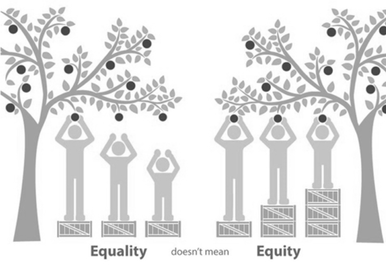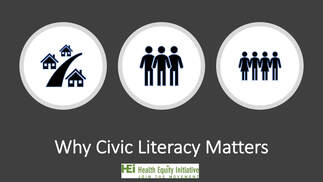|
If you are a professional or a writer who is passionate about health, racial, and social equity, consider contributing to our blog! Visit our Volunteer page to learn more. |
|
by Alka Mansukhani , Lisa Goren and Renata Schiavo
Sadly, many students are not provided with an opportunity to learn about how their government works and may feel powerless about their ability to make an impact. Some may feel cynical and disconnected from public institutions and from centers of power. Educating students about local government, and modeling how to engage with those in authority would give them access and agency—both in local matters and in decisions affecting their lives. Most importantly, it would provide them with the skills they need to assess the impact of policies throughout their lives. Civic engagement is linked to health: Several organizations and frameworks support this statement. As an example, the Robert Wood Johnson Foundation (RWJF)'s signature "culture of health" framework identifies civic engagement, which is defined broadly as participating in activities that advance the public good, as one of the key drivers toward health equity. Their analysis determines that civic engagement can "serve as a mechanism for translating changes in a health-related mindset and sense of community into tangible actions that could lead to new health-promoting partnerships, improvements in community health conditions, and the degree of integration among health services and systems for better health outcomes (2)."
Civic engagement—whether through volunteering or participating in the work of civic organizations or becoming an advocate to advance health and social issues—is also positively related to increased individual well-being, both physical and mental. While this relationship has not been well researched, a few studies suggest that health and civic engagement may be tied in a feedback loop. For example, early depression is associated with less engagement later in life, and early civic engagement is associated with less depression later in life (2). Effective civic engagement cannot happen in absence of civic literacy, which should not be limited to the understanding of civic processes and governing bodies, but should also include the ability of citizens to discern between evidence-based information and "fake news", as well as increased empathy for the well-being of others in their community. The concept that everyone's well-being is linked to everyone's prosperity and that "in our global and interconnected culture, we can no longer afford"—and neither is it moral—"to identify only with people who seem to be part of our tribe (3)"--should inform efforts to promote civic literacy and inspire young minds. In exposing existing racial and health inequities, the current global COVID-19 pandemic has served to increase awareness of the need for a more fair and equitable society. Among many young people, it has also sparked an active interest in knowing how to become involved. Online classes during the pandemic could present a good opportunity to increase and expand civic literacy. Findings from the Center for Civic Engagement surveys of "Citizen Scholar" courses on civic literacy suggest that participation in online civics projects and current events analysis contributed to increase students' civic knowledge and helped nourish the kinds of skills that are needed to become effectively engaged in the political process (4). Moreover, learning how to navigate different kinds of systems and to connect with those in power might inspire students about their future and careers, and enable them to become powerful voices in their communities and beyond. Overall, while we should continue to build evidence on how civic literacy specifically influences structural and systemic barriers to health and well being, (particularly in communities that are disproportionately affected by such barriers), existing experiences point to the importance of promoting civic literacy as a path towards increased civic engagement, a more just society, as well as health and racial equity. References 1) Kahne J. E., Sporte S. E. (2008). Developing citizens: The impact of civic learning opportunities on students' commitment to civic participation. American Educational Research Journal, 45(3): 738–766. 2) RAND Corporation. (2019). Examining Civic Engagement Links to Health: Findings from the Literature and Implications for a Culture of Health. Retrieved November 2020 from: https://www.rand.org/pubs/research_reports/RR3163.html 3) Reiss, H. (2018). The Empathy Effect: Seven Neuroscience-Based Keys for Transforming the Way we Live, Love, Work and Connect Across Differences. Sounds True. 4) Political Science Now. (2020). Promoting Civic Literacy and Engagement during the COVID-19 Pandemic. Retrieved November 2020 from: https://politicalsciencenow.com/promoting-civic-literacy-and-engagement-during-the-covid-19-pandemic/ About the Authors Dr. Alka Mansukhani is a board member and treasurer at Health Equity Initiative since its founding in 2011. She currently serves also as the organization’s Co-Vice President. Alka is actively involved in neighborhood development in Long Island City, Queens, where she lives. Read her full bio. Lisa Goren is a senior manager at New York Magazine and a graduate student of American Studies at Columbia University. She is concerned with improving community engagement and structural equity. Renata Schiavo, PhD, MA, CCL, is the founder and board president at Health Equity Initiative. She is a passionate advocate for health equity and a committed voice on the importance of addressing and removing barriers that prevent people from leading healthy and productive lives. Read her full bio.
3 Comments
Maheswar Satpathy
11/30/2020 09:41:19 am
Extremely well analyzed and written with passion by the Team. Love the perspective offered towards advancing Health Equity.
Reply
9/10/2023 07:16:02 am
Businesses benefit from https://storeopinion-can.com/ by gaining valuable insights into customer preferences and perceptions. This information helps them make informed decisions to enhance their products, services, and overall customer experience. Participate in the survey at https://storeopinion-can.com/ and get a chance to win a $1000 Optimum PC gift card.
Reply
Leave a Reply. |
Archives
June 2023
CategoriesEditors:
Renata Schiavo, PhD, MA, CCL Alka Mansukhani, PhD, MS Radhika Ramesh, MA Guest posts are by invitation only. |




 RSS Feed
RSS Feed
